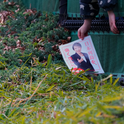The attempted poisoning of a former Russian double agent in Salisbury has broken all the rules. Not just those on criminal violence, or on acts of aggression in foreign countries. By attempting to assassinate Sergei Skripal, Vladimir Putin has fundamentally changed the rules of the spying game. The implications of that are far-reaching.
In 2004, Skripal was caught by the FSB and jailed in Russia for passing secrets to MI6. But in 2010, he was pardoned by the then Russian President Dmitry Medvedev, and exchanged along with three other former spies in a handover at Vienna airport. When it comes to former agents who have been exchanged in this way, the unwritten rule of the Cold War was well-known—once handed over, they were considered out of the game. They were no longer targets, and neither were their families. That’s how it went.
Until Skripal, that is. He breaks that mould. Putin has now made clear that Russia will attack its enemies wherever they are and even if that brings risks for the Kremlin in the form of sanctions and international isolation. Coverage of the attack in the Russian state media has been of denial—but in parallel with statements that this is what happens to traitors. That mirrors Putin’s own position.
The old convention is gone. Putin’s message to those who’ve acted against Russia is clear—there are no rules.
That leaves us facing a wall of questions. Here are five:
Why has this happened?
It is unlikely that the attack was directly related to the Russian presidential election. After all, the result of that vote is not in any doubt. Putin will win by a huge margin—he doesn’t need to drum up support.The motivation behind the attack is suggested by its very outlandishness. In the cold calculation of these things, there are straightforward ways to kill someone, and there are the more complicated methods. Leon Trotsky, the first in the long line of overseas Russian assassinations, was dispatched in 1940 using an ice axe—a cumbersome, but direct method. The use of a highly toxic nerve agent in broad daylight on foreign soil, as was the case with Skripal, is about as baroque an assassination method as it is possible to dream up.
The eye-catching method is a warning, directed at the large number of Russians who live in the UK, particularly London. It is a reminder that they are not safe, or beyond the reach of the authorities back home. It is also an assertion of the new kind of power that Putin wields. The swap in which Skripal came to the UK was made at a time when Putin was not in charge. Putin’s narrative has been that Russian leadership at the time was limp. The attack on Skripal indicates that he doesn’t consider himself bound by what others agreed at the time.
Was it a message to Britain?
An operation of this sort is also a message to the British government, which has been outspoken in its criticism of Russia. The Ministry of Defence has frequently criticised incursions of Russian aircraft into British airspace and Nick Carter, the Chief of the General Staff, warned in a speech in January that Russia poses a serious threat to the west.One analyst remarked recently that Britain “sticks out like a sore thumb,” when it comes to criticising the Kremlin. Slapping Britain across the face may well have been the aim of the operation.
What are the risks of response?
The Prime Minister has announced the expulsion of 23 Russian diplomats and the cutting of various ties with the Kremlin. But other countries will not be able to follow these concrete steps. There is no sign that the United States or European Union are willing to enact wide-scale economic sanctions on Russia, of the sort that would really hurt the Russian economy—and by association, Putin.It is worth remembering that the Litvinenko poisoning elicited strong statements of solidarity from other countries, but little else. The risk now is that Britain will adopt a posture towards Russia unlike that of its allies. This will mark a subtle but distinct separation of Britain from the rest.
As such, the UK risks being isolated from its allies and painted as unreasonably anti-Russian. This in turn will reinforce Putin’s domestic narrative of Russia as a siege nation treated badly by the selfish west.
It is unlikely that Putin will threaten British oil interests in Russia, for example that he might nationalise the stake in Rosneft owned by BP. Putin’s long-term strategy is to lift the restrictions on deep sea drilling technology, covered by current sanctions and crucial to the Russian oil and gas industry’s future. He is unlikely to do anything that will threaten his ability to access that technology.
Why now?
Skripal posed no real threat. He was 15 years out of date and had last been active in the 1990s. Putin is under no political pressure at home, and there is no sign that he faces a threat to his authority from any internal faction. And so this question “why now?” remains an imponderable. Of the experts I have spoken to about the Salisbury attack, none was able to answer the question why now? Perhaps the only real answer is with another question—why not now?What next?
Russia denies involvement in the whole affair, but there is no credibility in that denial. It will be instructive to see who sides with Putin in dismissing the evidence of the Kremlin’s involvement.But the suggestion that this may have been the work of a rogue element doesn’t hold water. It is inconceivable that some group within the Russian intelligence or security apparatus would have done this without Putin’s sign-off.
The attack in Salisbury was an outrage, but it was pitched just below the level of what constitutes an act of outright war. Putin has gone right up to the line, and has done so knowing that he faces no threat of an equal and opposite British response.
Being able to hit just below the threshold of war is a strategy for the future. It is the new normal, and not the exception. Chances are he’ll do it again.












